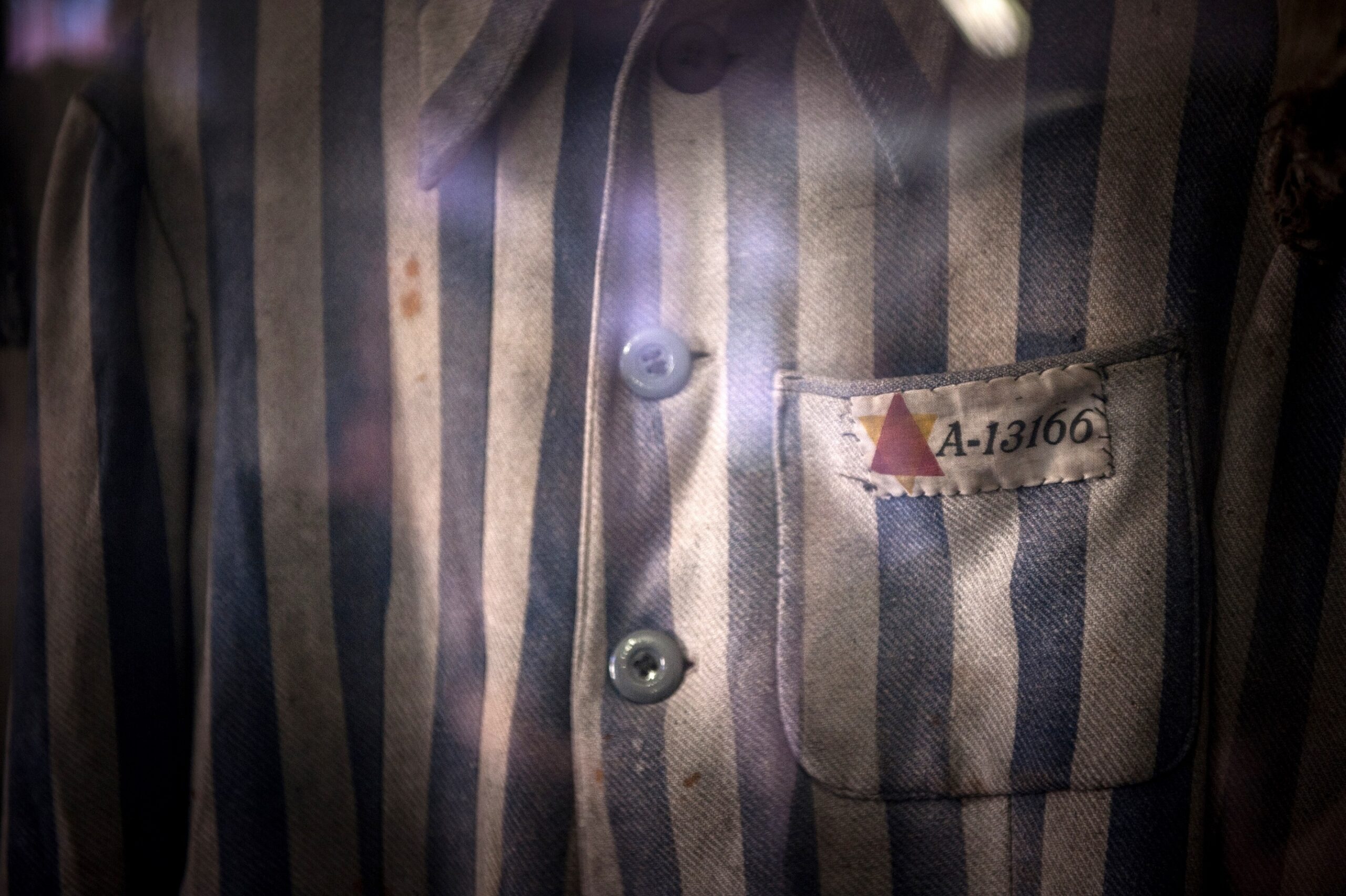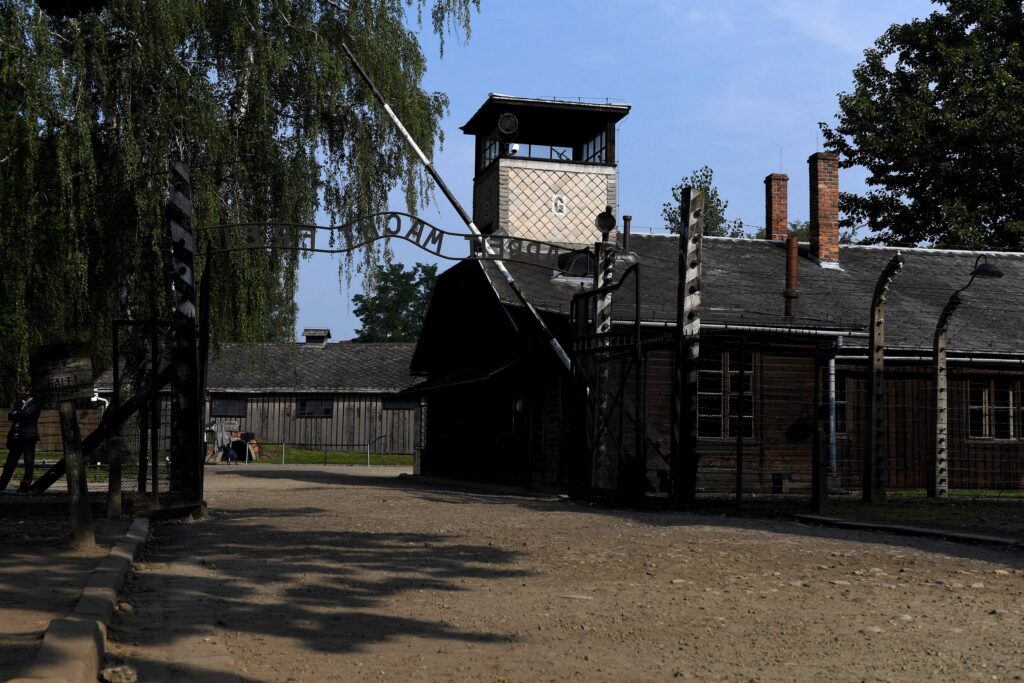Polish historian: War in Europe was never to reoccur (EN+IT)


fot. episkopat.pl
We had hoped World War II would be a warning for humanity, first of all for the Europeans, who had so recently experienced its atrocities. War in Europe was never to have reoccurred, Family News Service was told by Dr. Robert Derewenda, Director of the Lublin Bureau of the National Remembrance Institute, a lecturer at the John Paul II Catholic University of Lublin. Dr. Derewenda was interviewed on the Day of Remembrance for Victims of the German Nazi Concentration Camps and Death Camps. Since 2006, this day has been commemorated across Poland on June 14.
*
Speravamo che la seconda guerra mondiale fosse un monito per l’umanità, e soprattutto per gli europei, che recentemente ne hanno sperimentato la crudeltà. La guerra in Europa non si sarebbe mai più ripetuta – ha affermato a Family News Service il dott. Robert Derewenda, Direttore dell’Istituto di Memoria Nazionale di Lublino, docente all’Università Cattolica Giovanni Paolo II di Lublino in occasione della Giornata della Memoria per le Vittime dei Campi di Concentramento e dei Campi di Sterminio Nazisti Tedeschi. Dal 2006 questa Giornata si celebra in tutta la Polonia il 14 giugno.
“The current situation resonates with today’s commemoration of the Day of Remembrance for Victims of the German Nazi Concentration Camps and Death Camps. Never would we expect that today, in the 21st century, war could reoccur. This war threatens the Ukrainian nation in the heart of Europe. We had hoped that World War II would serve as a warning for humanity, first of all for the Europeans, who had only recently experienced its atrocities. The war was only meant to be learned about from books. War in Europe was never to have happened again,” stressed Dr. Derewenda.
Director of the IPN in Lublin observed that today, at the onset of an ongoing conflict in Ukraine, we must be made aware of the dire ramifications of any war. “During World War II, inhumane atrocities did not happen right away. Humans crossed ever new lines. The occupation of Austria, Czechoslovakia and Poland was soon followed by the invasion of other countries. Concentration camps which were established first gave rise to the comprehensive death and extermination machine; what started off as concentration camps turned into death camps.”
The researcher pointed to the wave of fake news and manipulation in the communications media concerning the situation in Ukraine. The historian stressed that just as during World War II, today one notices efforts to justify military action to diminish responsibility for the crimes committed. “While during World War II the identification of the perpetrators was indisputable, once the war was over this began to change. It was pointed out that perhaps if it had not been for the consent and tacit approval of other nations the Holocaust might not have happened. Attempts were made to relativize the responsibility of the Germans for the crime machine that they not only set in motion, but also carried out until the very last days of the war. Today one can also observe attempts at manipulation. During World War II, the Germans used ideology to justify their operations, while today the Russian side is looking for some justification to invade Ukraine and take hold of its sovereign lands at the price of murdering people. It is difficult to convince the victims, but the perpetrators create a certain space to assuage their remorse. We know this from the time of the Second World War,” emphasized Dr. Derewenda.
“Today we are on the cusp of a certain process that has been set in motion in Ukraine. However, a question arises whether as Europe or as the world we will be able to stop further escalation of Vladimir Putin’s actions, or whether will we allow this dictator to go further?” asked the scholar.
The central celebrations of the Day of Remembrance for Victims of the German Nazi Concentration Camps and Death Camps will begin in the Pawiak Prison Museum in Warsaw. After a shared prayer, the participants will lay wreaths at the Warsaw-based Mausoleum of Concentration Camps Victims at Powązki Military Cemetery. The day will see a number of festivities and special events across Poland.
Director of the Museum in Treblinka Edward Kopówka notices that the Day of Remembrance for Victims of the German Nazi Concentration Camps presents an opportunity for paying joint homage to the victims of the most dreadful places. He stresses that “It is a time of a joint reckoning with the atrocity of that time. This year the celebrations in the Museum in Treblinka will be attended by a group of German citizens from Saxony-Anhalt. We will plant a tree together in the Korczak Woods to commemorate Janusz Korczak, his wards and collaborators on the 80th anniversary of his death. This will be a time of reconciliation, understanding and a joint call for peace.”
“+Never Again+ is the motto of the Museum in Treblinka. It seems that the modern world has failed to hear this message. Today we all live in the shadow of an ongoing war. We see that it leads to destruction, cruelty and human tragedy. Television has kept us abreast of what is happening in Ukraine for over a hundred days now. We can see with our own eyes what war entails. War is not mere history. A question arises, however, why has this history repeated itself? Why has this dreadful war lasted so long? What can be done to stop it so that peace can prevail?” – asked Director of the Museum in Treblinka.
The Day of Remembrance for Victims of the German Nazi Concentration Camps and Death Camps is held on June 14 to mark the first mass transportation of 728 Poles from the prison in Tarnów to the German Nazi Concentration Camp Auschwitz. As of 2006 the anniversary has been celebrated as the National Day of Remembrance for Victims of the Nazi Concentration Camps. In 2015, in line with historical truth about the nature of the camps and the perpetrators of the crimes committed there, Polish Parliament (Sejm) renamed it the National Day of Remembrance for Victims of the German Nazi Concentration Camps and Death Camps.

fot. episkopat.pl
*
“La situazione odierna è di grande attualità nel contesto della Giornata della Memoria per le Vittime dei Campi di Concentramento e dei Campi di Sterminio Nazisti Tedeschi. Non ci aspettavamo che oggi, nel XXI secolo, la guerra potesse ripetersi. Una guerra che minaccia un popolo al centro dell’Europa: quello ucraino. Speravamo che la seconda guerra mondiale fosse un monito per l’umanità, e soprattutto per gli europei, che recentemente ne hanno sperimentato la crudeltà. La guerra doveva essere qualcosa che avremmo imparato solo dai libri. La guerra in Europa non sarebbe mai più ripetuta” – ha dichiarato il dott. Derewenda.
Come sottolinea oggi il Direttore dell’Istituto di Memoria Nazionale di Lublino, ancora all’inizio del conflitto in corso in Ucraina, vale la pena ricordare a cosa sta portando la guerra. “Durante la seconda guerra mondiale, non da subito si giunse alle situazioni disumane che ebbero luogo in seguito. L’essere umano si trascinava sempre più lontano. Prima c’è stata l’occupazione dell’Austria, della Repubblica Ceca, della Polonia e poi degli altri paesi. All’inizio si cominciarono a costruire i campi di concentramento e poi da questi campi furono create intere macchine di morte e sterminio, che trasformarono questi campi di concentramento in campi di sterminio”.
Il Docente dell’Università Cattolica di Lublino ha anche richiamato l’attenzione sull’ondata di fake news e manipolazioni che appaiono sui media riguardo alla situazione in Ucraina. Ha sottolineato che proprio come durante la seconda guerra mondiale, anche oggi c’è la tendenza a giustificare le azioni militari intraprese per rigettare la responsabilità dei crimini commessi. “Tanto quanto durante la seconda guerra mondiale il nome dei carnefici era indiscutibile, così quella immagine iniziò a cambiare dopo la sua fine. È stato affermato che forse l’olocausto non sarebbe potuto avvenire se non fosse stato con il permesso e il tacito consenso di altre nazioni. Furono fatti tentativi per relativizzare la responsabilità dei tedeschi per l’intera macchina del crimine, che non solo avevano messo in moto, ma che portarono avanti fino agli ultimi giorni di guerra. Anche oggi si notano tentativi di manipolazione. Come durante la seconda guerra mondiale i tedeschi giustificarono alcune azioni con l’ideologia, così oggi la parte russa cerca una certa giustificazione per l’attacco all’Ucraina e la presa delle sue terre sovrane a costo di privare le persone della vita. È difficile convincere le vittime, ma i carnefici creano uno spazio per alleviare i rimorsi della coscienza. Così come accadde durante la seconda guerra mondiale” – ha sottolineato lo storico.
“Oggi siamo solo alle soglie di un certo processo che è stato avviato in Ucraina. Sorge però la domanda, se come Europa o come mondo, saremo in grado di fermare l’ulteriore escalation delle azioni di Vladimir Putin, o se permetteremo a questo dittatore di andare oltre” – ha aggiunto il dott. Derewenda.
La celebrazione centrale della Giornata della Memoria per le Vittime dei Campi di Concentramento e dei Campi di Sterminio nazisti tedeschi inizierà presso il Museo della Prigione Pawiak a Varsavia. Dopo aver pregato insieme al Cimitero Militare della Capitale a Powązki, i partecipanti deporranno fiori presso il Mausoleo delle Vittime dei Campi di Concentramento. La Giornata sarà inoltre accompagnata da celebrazioni ed eventi speciali in tutto il Paese.
Come sottolineato da Edward Kopówka, Direttore del Museo di Treblinka, la Giornata della Memoria per le Vittime dei Campi di Concentramento Nazisti Tedeschi è un’occasione per commemorare insieme le vittime di questi luoghi terribili. “È il momento di misurarsi insieme con la crudeltà di quel periodo. Quest’anno un gruppo di cittadini tedeschi di Anhalt in Sassonia parteciperà alle celebrazioni al Museo di Treblinka. Pianteremo insieme un albero nella foresta di Korczak per commemorare Janusz Korczak, i suoi alunni e collaboratori nell’80.mo anniversario della sua morte. Sarà per tutti noi un momento di riconciliazione, di comprensione e un comune appello alla pace” – ha sottolineato.
“Il motto del Museo di Treblinka è – ‘Mai più’. Sembra che il mondo moderno non abbia ascoltato questo messaggio. Oggi viviamo tutti all’ombra di una guerra in corso. Ne vediamo gli effetti: distruzione, crudeltà, tragedia umana. Da oltre cento giorni la televisione ci racconta ogni giorno cosa sta succedendo in Ucraina. Vediamo con i nostri occhi cosa porta la guerra. Questa non è solo storia. Nasce però la domanda: perché questa storia si è ripetuta? Perché questa terribile guerra va avanti così a lungo? Cosa fare per fermarla, per far sì che sorga la pace?” – h a aggiunto il Direttore del Museo di Treblinka.
La Giornata della Memoria per le Vittime dei Campi di Concentramento e di Sterminio Nazisti Tedeschi si celebra il 14 giugno, nell’anniversario del primo trasporto di massa di 728 polacchi dal carcere di Tarnów al campo di concentramento tedesco di Auschwitz. Dal 2006 questo anniversario è celebrato come Giornata di Memoria Nazionale per le Vittime dei Campi di Concentramento Nel 2015, in conformità con la verità storica sulla natura dei campi e sugli autori dei crimini ivi commessi, il Parlamento ha modificato il nome in Giornata Nazionale di Memoria per le Vittime dei Campi di Concentramento e dei Campi di Sterminio Nazisti Tedeschi.



Dodaj komentarz